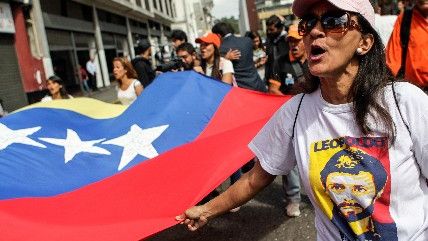Venezuela Prepares for Massive Protests By Arresting Activists
2008 Cato Institute Milton Friedman Prize winner Yon Goicoechea is among the arrested.

As Venezuela prepares for nationwide protests calling for the recall of its wildly unpopular President Nicolas Maduro scheduled for this Thursday, its socialist government is arresting activist leaders and opposition politicians.
In other words, business as usual for the "Chavista" regime, which continues to oversee a complete collapse of the economy and the rule of law in an oil-rich nation once described by delusional liberal economic writers as an "economic miracle," but which now features forced labor, starvation, triple-digit inflation, extreme scarcity of basic household goods, and frequent political violence.
Among the recently arrested activists is Yon Goiceochea, a former student activist who in the previous decade was a leader in the movement which stopped former President Hugo Chavez from altering the constitution to further consolidate power in the presidency.
At the height of the protests in late 2007, Goiceochea was quoted by the Washington Post as saying, "This is not a war of left and right," adding, "We believe that Venezuela has to have democracy. Democracy means respect. Democracy means free expression. Democracy means saying what you want without repression."
Goicoechea, who was awarded the Cato Institute's 2008 Miltion Friedman Prize, was accused by the government of "possessing detonating cords for explosive devices," according to Bloomberg. In a nationally televised address, Diosdado Cabello — called the "Frank Underwood of Venezuela" by The Atlantic and the Venezuela's "No. 2 official" by The Wall Street Journal — cited the cash prize Goicoechea received from the Cato Institute as evidence that he was a paid agent of U.S. forces intent on stirring up a violent coup.
Ian Vazquez responds to Goicoechea's arrest on the Cato at Liberty blog:
This is an old trick of the Chavista regime—distract attention from the severe political, economic and social crisis that it has inflicted on the country. Venezuela's so-called Socialism of the 21st Century has produced shortages of everything from food and water, to medicine and electricity. Hunger is becoming widespread, the rate of violence is among the worst in the world, and the regime has become extremely unpopular. (We have commented on this downward spiral here, here, here, and here).
Yon won the Friedman Prize in 2008 for having led the student movement that played the central role in defeating the constitutional reform that would have given Hugo Chavez what at that time would have been an unprecedented concentration of political and economic power. One of Yon's and the student movement's central tenets is their advocacy of non-violence in the promotion of basic freedoms and democracy. Yon also offers an optimistic vision about the future and potential of his country (see his Friedman Prize acceptance speech here). That approach contrasts with the regime's constant reliance on repression and force and helps explain its appeal to most Venezuelans. For the same reason, the government's claim of terrorism on Yon's part lacks any credibility. The idea that the Friedman Prize is awarded so that the recipient carry out specific tasks is also risible. The prize is given "to an individual who has made a significant contribution to advance human freedom," and has no conditions attached to it whatsoever. It has been awarded to numerous freedom champions from around the world including prominent reformers and human rights and freedom of speech advocates.
If Maduro — who currently holds an approval rating of about 22 percent — is able to delay a referendum on his presidency past Jan. 10, he would be able to hand-pick his successor to finish the final two years of his presidential term, even if we were recalled. Venezuela's national election council has hinted at, but not committed to, holding a referendum in February.


Show Comments (57)